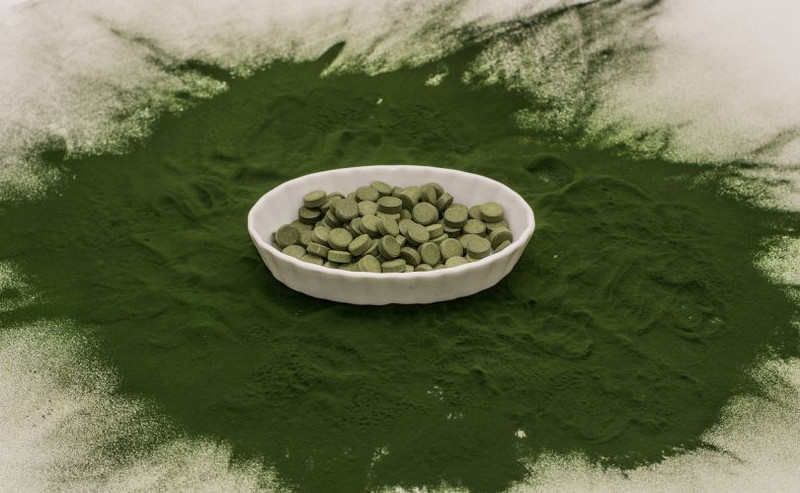Periodically in this space we write about various superfoods, ones that pack a wallop nutritionally and can tackle an assortment of health-related issues, making us feel better inside and out. Most of the time when we discuss such superfoods, we talk about stuff that is above ground or at least in the ground when it gets harvested. Today, we're going to stick our heads in the water, and below the surface we see a type of freshwater algae known as chlorella. Yeah, it's worthy of superfood status as well. Most chlorella that can be found and is sold in the U.S. actually comes from Japan or Taiwan. From there it is processed and then made into tablets and liquid extracts, which are to be sold as nutritional supplements, per webmd.com. An interesting side note about chlorella per wellnessmama.com – it is one of the world's oldest-known species and has the uncanny capacity to reproduce eight times daily, which certainly qualifies it as a sustainable nutrient source. Also going by such names as Bulgarian green algae and algue verte d'eau douce, chlorella can do many things beneficial for our health. That includes increasing the good bacteria in our gut – which in a very real sense is our body's version of grand central station for driving health throughout our bodies – in order to enhance digestion.
It's Easy Being Green
Chlorella, as you might expect from what you've (hopefully) read so far, is a rich green that is courtesy of the ample presence of chlorophyll, also identified as a 'superfood'. For years it has been drilled into our heads that eating leafy, green vegetables is good for us and our health – and that is not a lie – but getting our hands on and consuming the recommended daily dose of five to seven servings of veggies a day is easier said than done. Enter chlorella as a one-food cavalry. In this regard, a one-ounce (three tablespoon) serving of chlorella can go a long way in meeting that daily dose, or Recommended Daily Allowance (RDA), suggested by nutritionists. Per draxe.com, such a serving of chlorella – which provides most if not all amino acids deemed dietary-essential, per herbwisdom.com – contains the following:- 16 grams of protein (that's good, trust us)
- 287% RDA of vitamin A
- 71% RDA of vitamin B2
- 33% RDA of vitamin B3
- 202% RDA of iron
- 22% RDA of magnesium
- 133% RDA of zinc
Chlorella's Health Benefits
As with any other substance, compound, food, etc. that we discuss on this website, readers are advised to discuss use of chlorella with their physician or another health-care provider before adding it to their regular diet or supplemental regimen. That said, here is a rundown of some of chlorella's most notable health benefits that have been reported:- Detoxification: Its small size and unique properties make chlorella an ideal compound to bind to heavy metals and unhealthy chemicals in the body, thus helping to expedite their elimination from our bodies, per wellnessmama.com. In this regard, chlorella can assist the liver and detoxification pathways without accidentally scrubbing beneficial minerals out of the body.
- Immune system support: At least one study has shown regular use of chlorella is helpful in bolstering natural killer-cell activity and quick inflammatory response.
- Promote mental health: This benefit, cited at webmd.com, is most likely associated with chlorella because of its abundance of magnesium, low levels of which have been associated with poor memory.
- Anti-aging: Chlorella has been shown to be effective in giving our skin enhanced vitality by boosting vitamins A and C, and glutathione levels in our body, which helps to get rid of free radicals and protect our cells. The journal Clinical Laboratory, as cited at draxe.com, referenced a study that found chlorella can also help diminish oxidative stress linked to pollution, stress, and a poor diet.
- Reduce blood sugar and cholesterol: This has to be good news for those with type 2 diabetes and/or high cholesterol. Researchers have found that regular doses of chlorella can help reduce cholesterol and blood glucose levels while also activating cellular-level genes known to promote insulin insensitivity.
- Assist gastrointestinal (GI) tract: Studies have shown chlorella effective in boosting good bacteria in the GI tract, making it potentially useful in treating conditions such as ulcers, colitis, diverticulosis, constipation, and Crohn's disease, per herbwisdom.com.

